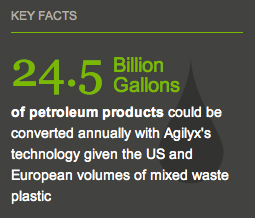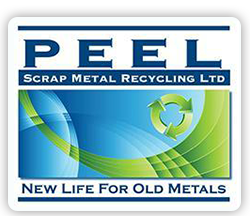The recycling process often generates its own stream of by-products which also require innovative solutions. Although our primary focus at Peel Scrap Metal is metal recycling, we increasingly have an interest in plastics since the introduction of our chopping line for wire and cable granulation.
Plastic & Copper
Our chopping line uses insulated wire and cable as its feedstock and separates the metal conductors, copper or aluminum, from the plastic sheathing which insulates those conductors. Both the metal and the plastic are chopped into granules as part of the separation process. The granulated metal is sold as a premium product or ‘chop’.
While the plastic is also recycled, it is a much more difficult product to deal with in terms of finding end users who will keep this material out of landfills. The main reason for the unique challenges with this material is that there are a number of different types of plastic used to insulate wire and cable. There is really no easy or cost effective method for sorting plastics the same way we can with metals. Plastics normally must be sorted by resin identification before they can be recycled and this can be costly.
The Plastics Issue
Without prejudice to concerns about our reliance on oil, the fact is that 8 to 10 percent of the non-renewable world oil and gas production is used to produce plastic and a further 3 to 4 percent is expended in the manufacturing process. Since, in theory, energy stored in anything can be converted back to energy, having non-biodegradable plastics sitting in landfills virtually forever is simply not a viable solution. Currently mixed waste plastics take up about 24 per cent of the space in landfills in the U.S. and the amount of plastic being sent there is growing at a rate of 4.5 percent annually.
An Innovative Solution
 Several years ago, we started following an innovative company in the U.S. that was looking for a solution to this problem. That company, Plas2Fuel, now Agilyx Corporation, has developed a process that converts mixed waste plastics to an oil which can be used to produce many petroleum based products including diesel, gasoline and other plastics. Since there are no limitations on the type of plastic this system uses as its feedstock, there is no sorting of plastics required and no need to clean the plastic of any contaminants. On average, 10 pounds of mixed plastic will produce one gallon of homogeneous crude oil product.
Several years ago, we started following an innovative company in the U.S. that was looking for a solution to this problem. That company, Plas2Fuel, now Agilyx Corporation, has developed a process that converts mixed waste plastics to an oil which can be used to produce many petroleum based products including diesel, gasoline and other plastics. Since there are no limitations on the type of plastic this system uses as its feedstock, there is no sorting of plastics required and no need to clean the plastic of any contaminants. On average, 10 pounds of mixed plastic will produce one gallon of homogeneous crude oil product.
How It Works

Essentially, the process melts granulated plastic and then vaporizes it and condenses it back into a liquid which is then run through a separator to remove the oil. The solution is unique because it uses plastic that no one else can process. Emissions from this process are far below allowable limits. Agilx has recently received $22 million in funding from venture capitalists to continue their work. While the Oregon company is not the only one involved with plastic conversion technology, it was the first to successfully gain permit approval in the U.S. and has the largest commercial operation of its kind in North America. We will continue to watch it closely as its technology increasingly becomes scalable.
Links
For a closer look at Agilx and their technology you can visit them on the web at http://www.agilyx.com and on Plas2Fuel videos on YouTube at http://tinyurl.com/3rorchc
For more information about our scrap wire processing operation visit, http://www.scrapwire.ca
